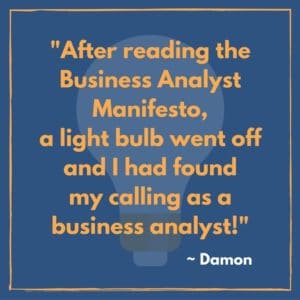In this interview, Damon shares his story going from tax auditor to business analyst to software developer to business analyst again. I love how Damon’s career path took a side road when he dipped his toes into a software development role, and that experience solidified his decision to continue in a business analyst career. Damon also makes some wonderful points about the difference between the business analyst job role and the title, which should help anyone who has BA experience increase their confidence in the relevance of their skills.
Laura: Why did you decide to pursue a business analysis career?
Damon: My career goals included (among other things that weren’t as practical for my situation, such as being a full-time river guide, or a Major League baseball player) combining creativity with technology to help solve real-world business problems. This was a broad definition, to be sure, but always remained in the back of my mind as I completed college in accounting and began my first post-college job as a tax auditor.

After 3 years of auditing, I decided to move my career into a position where I could exercise more of the creative side and found a job doing web-based software demonstrations. I quickly learned that I had a knack for determining the underlying business process goals, and then mapping the company’s needs to a custom solution, and also explaining the limitations of the technology and negotiating an alternative solution to successfully accommodate said limitations.
With this new found talent, I decided to look into what types of jobs would allow me to work to find business process problems and then brainstorm ways to solve them. That led me to discover Bridging the Gap after Googling, “discovering what the business problem really is”, and after reading the Business Analyst Manifesto, a light bulb went off and I had found my calling!
Laura: How did you end up in your first BA position? And what’s it been like so far?
Damon: I sort of grew into/created the business analyst position after spending 2-plus years working with customers and implementing custom solutions for a small, but growing software company. As an aside, while in this role, I also combined my consulting experience with furthering my education and earned an Associate’s Degree in Computer Information Systems.
Eventually, over hundreds of consultations, I had become a product and market expert which allowed me to evolve into an advocate for process and product improvement. So, when the company decided to develop an upgraded version of their software product, I took it upon myself to conduct a gap analysis between what we had vs. what the market demanded. By that time, along with my A.S. degree (mentioned above), I had also completed some online business analysis courses through Bridging the Gap and essentially migrated from my consulting role into a BA role (without the title).
Then, fortunately for me, the company decided to bring in a project manager to organize and move the new product development forward. He influenced the company to create a BA position for me, and I gained the title.
After spending almost 3 years as a business analyst getting their new product from initial ideas into a full blown released product, the company was bought by a private investment firm and a lot changed, including my day-to-day work as a business analyst. I fell into a psychological space where I didn’t know if what I was doing provided any value (as I’ve come to learn, this is a space where BAs can get to quite easily in their early years). So I left the BA position and the company to pursue web development.
In hindsight, breaking away from BA work and into actual software coding turned out to be an invaluable experience for furthering my business analysis career, because it taught me just how important a BA is on a software project. In my developer role, the company didn’t utilize any formal business analysis processes, and it showed. Many of my teammates would become very frustrated by a lack of clear requirements for their projects, and often the projects would (inexplicably – wink, wink) miss the mark.
From there, I decided that I wanted to get back into business analysis with a company that understood its value, and hung out my shingle (updated my resume), which led me to where I am now: working as a mid-level business systems analyst at a healthcare company.
I’m excited to continue to grow and develop in the complex, but exciting world of business analysis.
Laura: What do you consider as the keys to your success?
Damon: Being analytical and always asking questions, but then challenging the answers with opposing questions (sometimes all the way to paralysis by analysis) has helped me with getting to the root problems.
Also, having a self-motivated drive to figure things out. Not so much in the sense of solving a puzzle using software code (that’s definitely the key to becoming an excellent software developer), but more in line with, “Who do I need to ask to find this out, who would this affect most?” or, “What may be the real reason product A is being outsold by products B and C?”, and then not stopping your inquiry until you’ve truly found out.
Finally, I’ve found that being comfortable with a lot of ambiguity has been important. This is the hardest part of actual BA work, I think. Having a blue personality (referencing the color code personality ranges) which means I rarely have to be in charge of things helps with this need. If working in ambiguity is too hard to handle, a BA career will drive you nuts.
Laura: What recommendations would you make to others looking to follow a path like yours?

Also, another thing that’s helped me is being willing to try new things without knowing exactly how they will turn out. Basically, getting comfortable being outside your “comfort zone”. A lot of the time, BA work is in the “problem space” where there isn’t an answer or solution so it can be a little uncomfortable for problem solvers. So far, my experience as a BA has been to find and then articulate the actual problems so that others can execute on solutions.
Finally, I have an introvert personality, so I read multiple books about communicating effectively, from conversation skills to writing better emails. And this is a continuous exercise for me. Communication skills are critical for BA work, especially when you need to ask questions and gather details that aren’t exactly comfortable for someone to share since it could cause a perceived disruption to their comfort zone or job security (Crucial Conversations by Patterson, Grenny, McMillan, and Switzler is highly recommended).
Laura: Thank you so much for sharing your story! And I wish you all kinds of success in your business analyst career!
>>Read More Success Stories
Reno’s story is one of many BA career transition success stories here at Bridging the Gap. We’re honored to have had many readers tell us more about how they leveraged their professional experience to get started in business analyst job roles.
